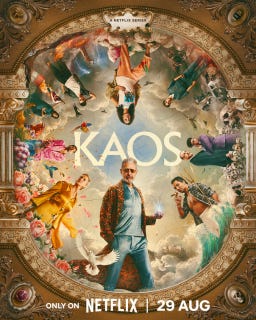My daughter, who is very busy and does not speak to me for light reasons, recently suggested that I look up the new Netflix series KAOS, a reinvention of Greek mythology in the modern day.
Reviews of KAOS say that it’s a dark comedy. I can’t see really anything in the first episode that is that funny. Sad, yes. Funny, no.
However, it’s really well done, and that’s what I want to talk about in this post.

Percy Jackson has sort of led the way in the past decade or so in seeing Greek mythology happening in the present, with the Olympian pantheon still active and working. That franchise is ostensibly aimed at teens.
KAOS is transparently for adults. TV-MA for sure.
We start with Jeff Goldblum as Zeus. He is the only recognizably bankable Hollywood actor in the series. The rest of the cast is a diverse mix, many of whom have British accents (KAOS is indeed British-produced). But the show doesn’t feel like a traditional Hollywood Greek mythology movie, where everyone has a British accent because Greek Mythology, somehow, has to be, like the Parthenon Marbles, the property of the British Empire. It isn’t that respectful.
Goldblum is famous for mugging—making faces in the camera as he says cleverly ironic things. This time he is pretty impressively not mugging, even though he has a lot of closeups. His issue is that there is a prophecy that he, Zeus, will be overthrown, and he is feeling the pressure.
Down in Greece, or specifically Crete (though the filmed locations are in Spain and Italy), humans still worship the gods, as if Christianity never appeared in the Mediterranean world. This is fun in a way, though I am one hundred percent certain you couldn’t make this series without the thoroughgoing influence of Christianity on modern creativity.
A post for another time.
There is an effort made, however, to reinvigorate the setting with the despair that was characteristic of human life in Greece and Rome before Christianity and resurrection came into the world.
There is a temple to Hera, and human sacrifice to Zeus, and pagan holidays, and prophecies (Cassandra has a strong cameo). The set decoration and locations are arresting. The fantasy aspect of the show does take you into that world, without it seeming too extreme.
I liked that, too.
The human drama begins with Orpheus and Eurydice, famous pair of tragic lovers. The problem: Eurydice is no longer in love with Orpheus, a world-famous rock star, but doesn’t know how to tell him.
Enter Dionysus, played by the very impressive Nabhaan Rizwan, who looks strangely like Jeff Goldblum, unless I am imagining things.
Dionysus is not satisfied with being the god of “madness and wild frenzy,” and longs for his dad to take him seriously. But Zeus is a narcissist, and rejects him with all the callousness of the classic Zeus archetype.
All this is being narrated by Prometheus, who does have a classic British actor’s accent.
And that is all I’ll say about the show. No spoilers.
It takes a lot for me to watch a TV show straight through nowadays. I’ve gotten more sensitive to suffering, or else shows are getting more intense and high stakes, or both.
But I will watch more of KAOS, and will report back (probably) on what I thought of it all. In the meantime, if you’ve watched it, I’d welcome your thoughts.



I quite liked the show although it’s a different take on the mythology
I promised to avoid criticism of misrepresented myths before beginning the series, and let it be a new myth. This approach is working thus far. It is a fun series, and your take on it is refreshing.